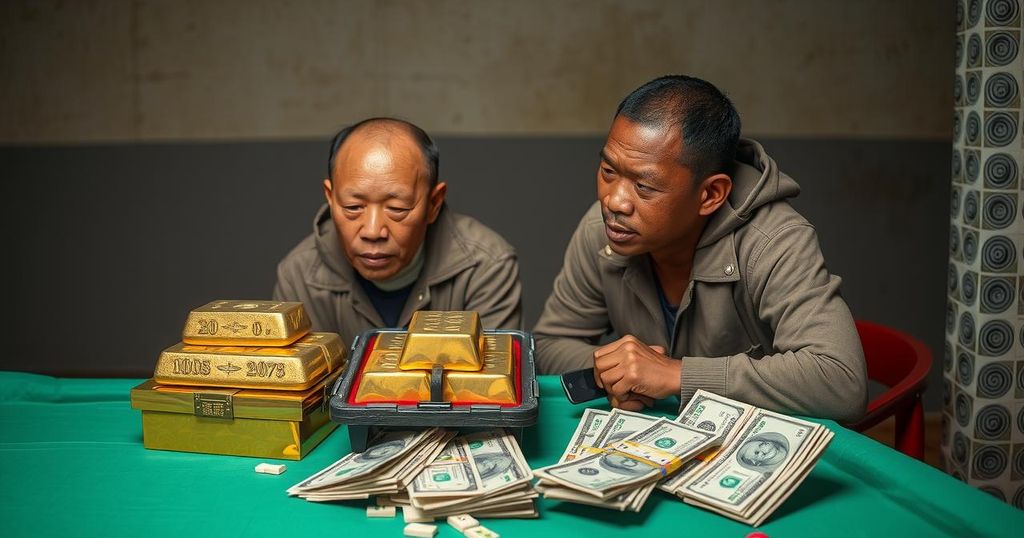Chinese Nationals Arrested in DR Congo with Gold Bars and Cash

Three Chinese nationals were arrested in eastern Democratic Republic of Congo after authorities seized 12 gold bars and $800,000 in cash hidden in their vehicle. The operation followed concerns over the release of other Chinese nationals linked to illegal mining activities. The region’s mineral wealth has been a source of foreign exploitation and conflict, complicating governmental efforts to regulate the industry.
Three Chinese nationals have been apprehended in eastern Democratic Republic of Congo after authorities discovered 12 gold bars and $800,000 in cash concealed beneath the seats of their vehicle. The arrest, managed discreetly by Governor Jean Jacques Purusi of South Kivu province, was initiated following concerns over the recent release of other Chinese individuals accused of operating illegal gold mines in the region. The governor cited a need for secrecy due to the interconnected interests of foreign dealers and influential figures in the capital, Kinshasa.
Eastern DR Congo is rich in resources such as gold and diamonds, a wealth that has attracted foreign exploitation since the colonial period and has resulted in prolonged instability affecting the area for three decades. Rival militia groups frequently control many of the region’s mines, benefitting from sales to intermediaries. Authorities conducted the operation in Walungu, bordering Rwanda, based on a tip-off that prompted a thorough search of the vehicle, but specifics regarding the total amount of gold seized were not disclosed.
The recent incidents echo a disturbing trend where foreign nationals, including 17 Chinese individuals arrested last month for illegal mining, were reportedly released, a situation Governor Purusi criticized as undermining efforts to reform DR Congo’s troubled mineral sector. These individuals had allegedly accrued $10 million in taxes and fines owed to the government, raising concerns about accountability. The Chinese embassy has not issued any statements regarding these allegations, leaving unanswered questions about the involvement of its nationals in the region’s mineral wealth exploitation.
The arrests occurred amid ongoing conflicts in nearby North Kivu province, where a rebel group, purportedly backed by Rwanda, has gained significant control over territories. Furthermore, the Congolese government is currently involved in legal action against Apple over the use of what it describes as “blood minerals,” with claims that such resources are laundered through international supply chains, intensifying violence and conflict while contributing to issues like forced child labor and environmental devastation.
The Democratic Republic of Congo (DRC) is endowed with significant mineral resources, particularly in the eastern region where gold and diamonds abound. These resources have not only attracted international attention but have also been exploited through various unscrupulous means. Foreign entities have historically dominated the extraction and trade of minerals, leading to accusations of exacerbating social unrest and supporting militia activities. Recent events, including arrests of foreign nationals for illegal mining, underscore the challenges faced by the DRC’s government in regulating its mineral sector and countering corruption and exploitation. Furthermore, the country is embroiled in broader geopolitical tensions, particularly with neighboring Rwanda, complicating efforts to establish a stable and transparent mining industry.
In summary, the arrest of three Chinese nationals in eastern Democratic Republic of Congo highlights ongoing issues related to illegal mining and the exploitation of the country’s vast mineral resources. The delicate balance of power between local militias and foreign interests continues to undermine stability in the region. The Congolese government faces significant challenges in enforcing regulations and ensuring accountability in its mineral sector, as evidenced by previous incidents involving foreign nationals who exploit the nation’s wealth without regard for the resulting socio-economic impacts. Continued vigilance and reform efforts will be critical in addressing these long-standing issues.
Original Source: www.bbc.com







